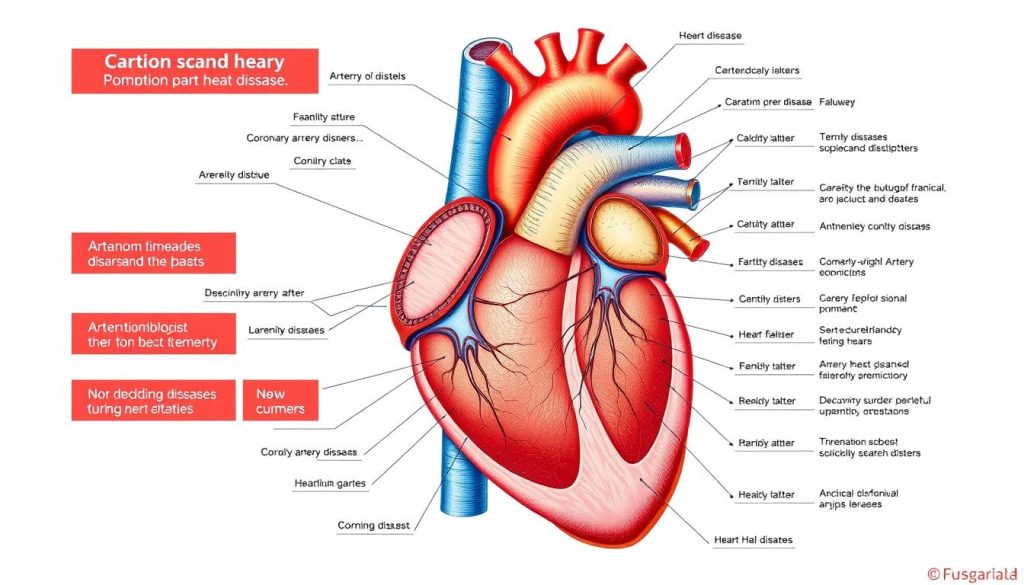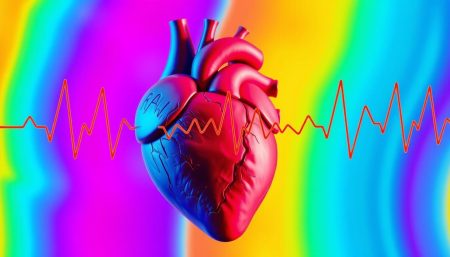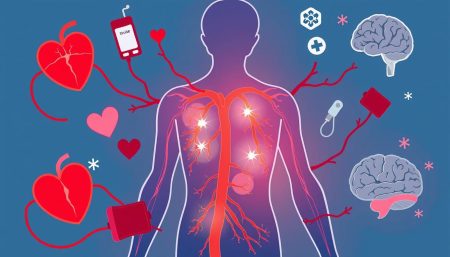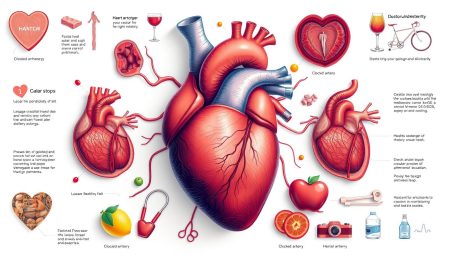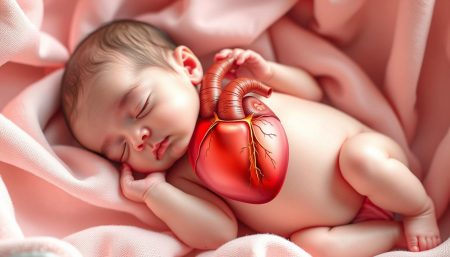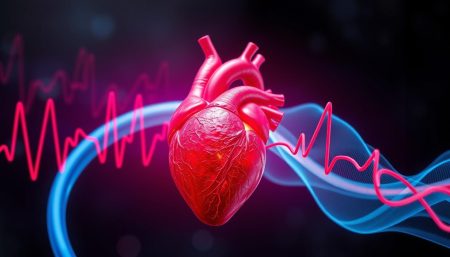Cardiovascular heart disease is a silent threat that affects millions of lives worldwide. It impacts the heart and blood vessels, leading to serious health complications. Heart attacks and strokes are just a few of the consequences.
Understanding cardiovascular heart disease is key for everyone. It’s not just a problem for older adults; it can affect people of all ages. By recognizing the signs and risk factors, we can protect our heart health.
In this article, we’ll explore the facts about cardiovascular heart disease. We’ll look at its causes, symptoms, and ways to prevent it. Knowledge is power when it comes to your heart health, so let’s dive in.
What Is Cardiovascular Heart Disease
Cardiovascular heart disease includes many conditions that affect the heart and blood vessels. It’s a major cause of death around the world, affecting millions every year.
Definition and Medical Classification
Cardiovascular disease is about problems with the heart and blood vessels. It often starts with atherosclerosis, where plaque builds up in arteries. This makes blood vessels narrow, reducing blood flow to the heart and other organs.
Types of Cardiovascular Conditions
Some common types are:
- Coronary artery disease: Narrowed heart arteries
- Heart failure: Heart can’t pump blood effectively
- Arrhythmias: Irregular heartbeats
- Valve diseases: Problems with heart valves
Global Impact and Statistics
Cardiovascular diseases kill millions every year. In the U.S., they cause one in four deaths. High blood pressure, smoking, and obesity are big risk factors.
| Condition | Global Prevalence | Annual Deaths |
|---|---|---|
| Coronary artery disease | 200 million | 9 million |
| Heart failure | 64 million | 1 million |
| Atherosclerosis | 1 billion | 15 million |
It’s important to understand cardiovascular heart disease to prevent and treat it early. Knowing about its types and effects helps us protect our heart health.
Common Symptoms and Warning Signs
It’s important to know the signs of heart disease early. Some symptoms are common, but others can vary by gender or condition.
Physical Symptoms to Watch For
There are several physical signs that could mean heart trouble. Chest pain, feeling like pressure or squeezing, is a big red flag. If you get short of breath easily, it could be a sign too. Feeling tired all the time, even after resting, is another warning.
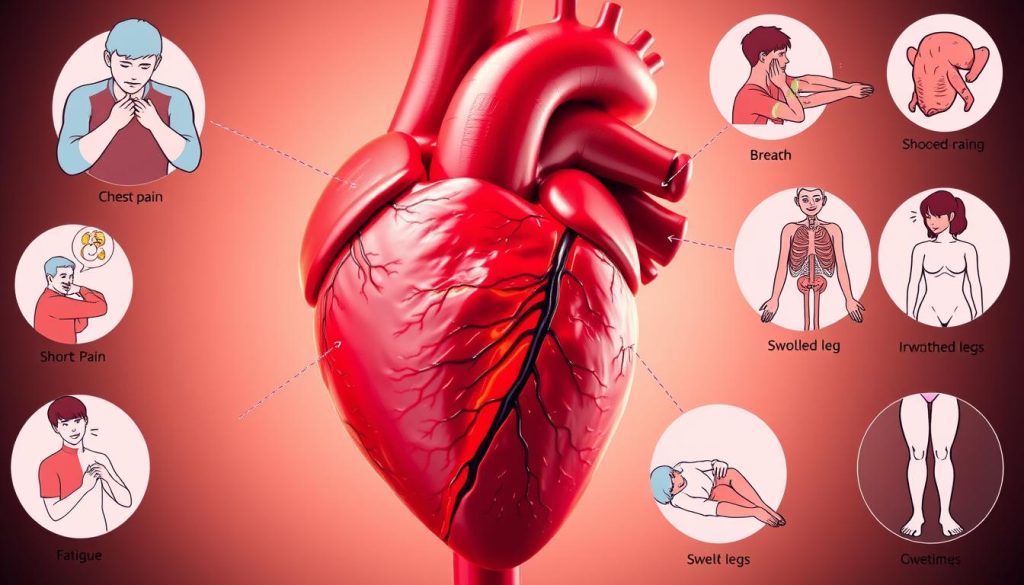
Emergency Warning Signs
Some symptoms need urgent medical help. These include:
- Sudden, severe chest pain
- Difficulty breathing or gasping for air
- Fainting or near-fainting episodes
- Rapid or irregular heartbeat
Gender-Specific Symptoms
Heart disease symptoms can differ between men and women. While both may feel chest pain, women often report:
| Women | Men |
|---|---|
| Neck, jaw, or back pain | Left arm pain |
| Nausea or vomiting | Cold sweat |
| Lightheadedness | Dizziness |
Knowing these symptoms can help spot heart problems early. If you feel chest pain, shortness of breath, or unusual tiredness, see a doctor right away.
Understanding Heart Attacks and Their Causes
Heart attacks, also known as myocardial infarctions, happen when blood can’t reach the heart. This is usually because of a blockage in the coronary arteries. This blockage is often caused by plaque buildup, known as atherosclerosis.
When this plaque bursts, it can create a clot. This clot blocks blood flow, leading to a heart attack.
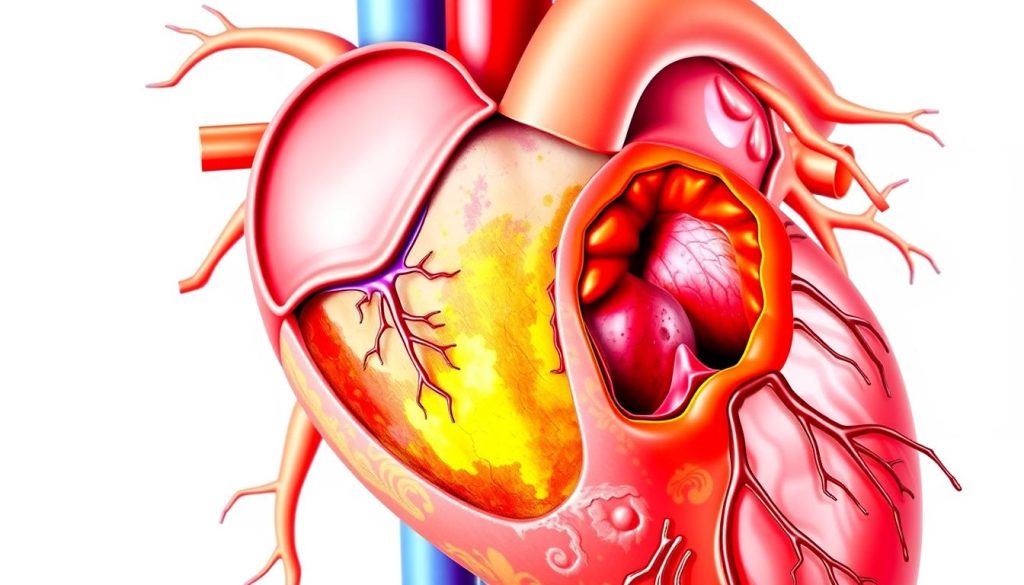
Coronary blockage is a main reason for heart attacks. Over time, arteries narrow, reducing blood to the heart. This can cause chest pain or angina.
In severe cases, a complete blockage can cause a heart attack. It can damage or destroy heart muscle.
It’s important to know the difference between a heart attack and cardiac arrest. A heart attack is a problem with blood flow. Cardiac arrest is when the heart suddenly stops beating.
Cardiac arrest can happen because of a heart attack. But it can also occur from other heart issues.
“Time is muscle. The longer a heart attack goes untreated, the more damage occurs to the heart.”
Risk factors for heart attacks include high blood pressure, high cholesterol, smoking, obesity, and diabetes. Making lifestyle changes and getting medical help can lower these risks.
Knowing the signs of a heart attack is key. Look out for chest pain, shortness of breath, and discomfort in the arm or jaw. Quick action is vital for better treatment and outcomes.
Risk Factors for Cardiovascular Disease
Knowing the risks of heart disease can help you stay healthy. Let’s look at the main factors that lead to heart problems.
Lifestyle Risk Factors
Our daily choices greatly affect our heart health. Smoking harms blood vessels and raises heart attack risk. Being overweight strains the heart, and not exercising weakens it.
Eating too much saturated fat and salt can cause high blood pressure and cholesterol problems.
Medical Risk Factors
Some health conditions raise the risk of heart disease. High blood pressure makes the heart work too hard, damaging arteries. Diabetes affects blood sugar, harming blood vessels over time.
Managing these conditions is key to keeping your heart healthy.
| Risk Factor | Impact on Heart | Prevention Tips |
|---|---|---|
| Smoking | Damages blood vessels | Quit smoking, avoid secondhand smoke |
| Obesity | Strains heart muscle | Maintain healthy weight, exercise regularly |
| Diabetes | Harms blood vessels | Control blood sugar, follow diabetes treatment plan |
| High Blood Pressure | Overworks heart | Reduce salt intake, manage stress |
Genetic and Family History
Your genes can affect your heart disease risk. If your family has early heart problems, you might be at higher risk. You can’t change your genes, but knowing your family history helps you take steps to prevent it.
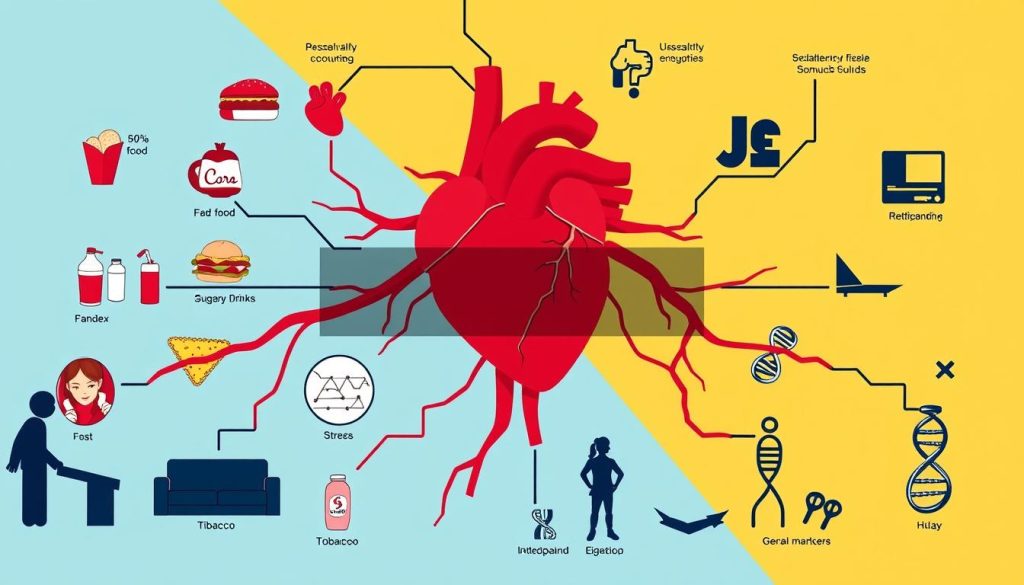
By changing your lifestyle and managing your health, you can lower your heart disease risk. Regular doctor visits are important for monitoring and managing your heart health.
The Role of High Blood Pressure in Heart Disease
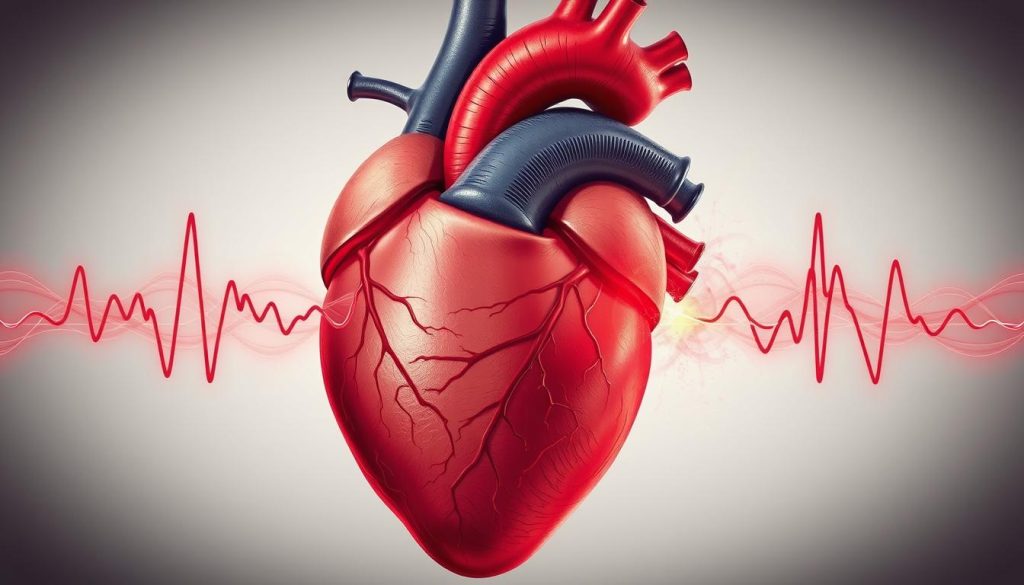
High blood pressure, or hypertension, is a big problem for heart health. It quietly damages blood vessels and puts extra work on the heart. This makes the heart work harder to pump blood around the body.
This extra work can cause several issues:
- Thickening of heart muscle
- Narrowing of arteries
- Increased risk of heart attacks
- Higher chance of strokes
Blood vessel damage from high blood pressure isn’t just a heart problem. It can also harm arteries all over the body. This can lead to kidney and vision problems.
“Hypertension is often called the ‘silent killer’ because it typically has no symptoms until significant damage has occurred.”
Keeping blood pressure in check is vital for heart health. Regular health checks, a balanced diet, exercise, and sometimes medicine can help. By managing blood pressure, you lower the risk of heart problems and protect your heart health.
| Blood Pressure Category | Systolic (mm Hg) | Diastolic (mm Hg) |
|---|---|---|
| Normal | Less than 120 | Less than 80 |
| Elevated | 120-129 | Less than 80 |
| Hypertension Stage 1 | 130-139 | 80-89 |
| Hypertension Stage 2 | 140 or higher | 90 or higher |
Knowing your blood pressure numbers is the first step to avoiding heart disease. Regular checks and making healthy lifestyle changes can greatly help manage high blood pressure. This protects your heart.
Cholesterol’s Impact on Heart Health
Cholesterol is key to heart health. Knowing how it works helps you take care of your heart. Let’s look at the types of cholesterol and their effects on your heart.
Good vs. Bad Cholesterol
HDL, or “good” cholesterol, helps clean your blood. LDL, or “bad” cholesterol, can clog your arteries. This increases your heart disease risk.
Dietary Influences on Cholesterol
Your diet greatly affects your cholesterol. Foods high in saturated fats raise LDL. But, eating fruits, veggies, and whole grains can lower LDL and increase HDL. Animal products have less of an effect on your cholesterol than thought.
Treatment Options for High Cholesterol
If diet and exercise don’t lower cholesterol, medication might be needed. Statins are the top choice for lowering LDL. They block a key cholesterol-making substance. Other options include bile acid sequestrants, cholesterol absorption inhibitors, and injectables.
“Managing your cholesterol is a key step in maintaining heart health. Regular check-ups and a heart-healthy lifestyle can make a significant difference.”
Cholesterol levels are just one part of heart health. Exercise, a balanced diet, and not smoking are also vital. They help keep your heart healthy.
Understanding Coronary Artery Disease
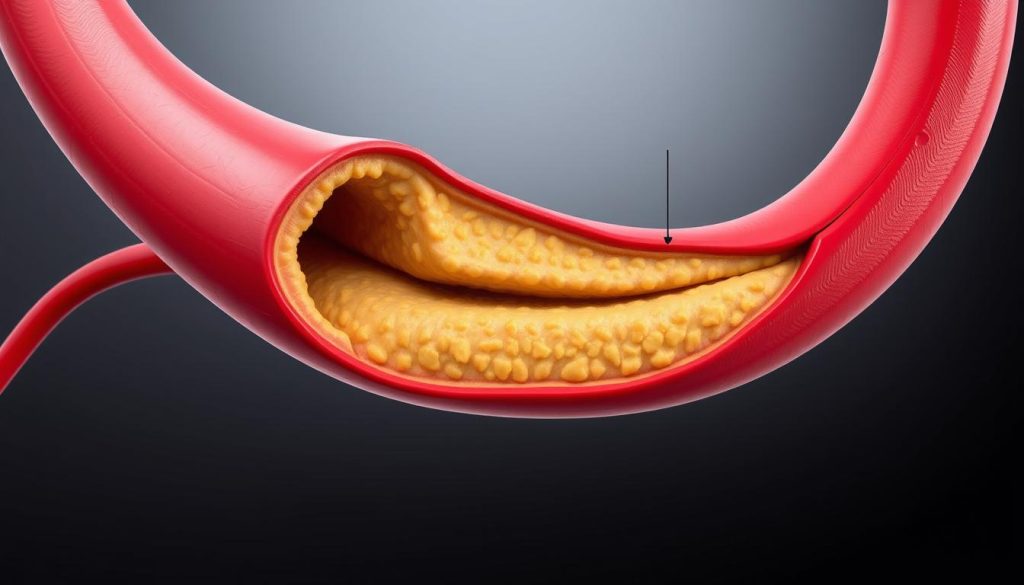
Coronary artery disease (CAD) is a serious heart condition that affects millions of Americans. It happens when plaque builds up in the arteries that supply blood to the heart. This buildup can reduce blood flow and oxygen to the heart muscle.
Plaque buildup occurs over time. It’s made of cholesterol, fatty substances, and waste products. As it builds up, it hardens and narrows the arteries. This is called atherosclerosis.
When the heart doesn’t get enough blood, it can cause angina. Angina is chest pain or discomfort that feels like pressure or squeezing. It’s often triggered by physical activity or stress. Some people describe it as feeling like indigestion or heartburn.
If left untreated, CAD can lead to heart muscle damage. This happens when blood flow is severely restricted or completely blocked. A total blockage can cause a heart attack, which can be life-threatening.
Risk factors for CAD include high blood pressure, high cholesterol, smoking, and diabetes. Family history also plays a role. Lifestyle changes, such as a heart-healthy diet and regular exercise, can help prevent or slow the progression of CAD.
Early detection and treatment of CAD are key. Regular check-ups and understanding warning signs can make a big difference. They help manage the condition and prevent serious complications.
Arrhythmia and Heart Rhythm Disorders
Heart rhythm disorders, or arrhythmias, happen when the heart’s electrical system goes wrong. This can cause your heart to beat too fast, too slow, or in an irregular pattern. We’ll look at the different types, how to diagnose them, and treatment options.
Types of Arrhythmias
There are many types of arrhythmias. Tachycardia is when your heart beats too quickly. Bradycardia is when it beats too slowly. Atrial fibrillation is when the heart’s upper chambers quiver in a chaotic way.
Diagnosis Methods
Doctors use several tests to find arrhythmias. An electrocardiogram (ECG) records the heart’s electrical activity. Holter monitors track your heart rhythm for 24 to 48 hours. Sometimes, doctors use an event recorder for longer monitoring.
Treatment Approaches
Treatment for arrhythmias depends on the type and how severe it is. For bradycardia, a pacemaker might be needed. Tachycardia often gets better with medication or cardioversion. Atrial fibrillation might need blood thinners to stop clots. In some cases, ablation procedures can fix the heart’s electrical pathways.
“Understanding your heart rhythm is key to maintaining overall cardiovascular health.”
If you feel symptoms like palpitations, dizziness, or fainting, see a doctor right away. Catching arrhythmias early and treating them can greatly improve your life and prevent serious problems.
Prevention Strategies and Lifestyle Changes
Starting to take care of your heart is easy. Eating a diet full of fruits, veggies, and whole grains is key. Cutting down on saturated fats and eating more fiber can greatly lower heart disease risk.
Regular exercise is also vital for a healthy heart. Try to do at least 150 minutes of moderate exercise or 75 minutes of vigorous exercise weekly. Walking fast, swimming, or biking can boost heart health and help with weight control.
- Eat a balanced diet with plenty of fruits and vegetables
- Engage in regular physical activity
- Quit smoking and limit alcohol consumption
- Maintain a healthy weight
- Get enough sleep (7-9 hours per night)
Don’t forget about stress management for heart health. Too much stress can raise blood pressure and lead to unhealthy habits. Try deep breathing, meditation, or yoga to lower stress.
“Prevention is better than cure. Small lifestyle changes can make a big difference in protecting your heart.”
Regular health checks and screenings are key for catching heart disease early. By making these lifestyle changes and working with your doctor, you can lower your heart disease risk. This way, you can live a healthier life.
Diagnosis and Testing Methods
Early detection is vital for heart health. Doctors use various diagnostic tests to check your heart’s function. These tests help spot issues early and guide treatment.
Common Diagnostic Tests
An electrocardiogram, or ECG, is often the first test. It records your heart’s electrical activity. This can show irregular rhythms or heart muscle damage.
An echocardiogram is another common test. It uses sound waves to create images of your heart. These images show your heart’s structure and how well it pumps.
Advanced Imaging Techniques
For a detailed look, doctors might order a cardiac CT scan. This test gives clear, 3D pictures of your heart and blood vessels. It helps find blockages or other problems.
A stress test is also valuable. It measures how your heart performs during physical activity. This test is important for assessing your heart’s health.
Laboratory Tests
Blood tests are key in assessing heart health. They check cholesterol levels and proteins that show heart damage. They also look at other factors that might raise your heart disease risk.
These tests, along with imaging and physical exams, give doctors a full picture of your heart health.
FAQ
Q: What is cardiovascular heart disease?
A: Cardiovascular heart disease is a group of conditions affecting the heart and blood vessels. It’s mainly caused by atherosclerosis, where plaque builds up in arteries. This leads to heart problems like coronary artery disease, heart attacks, and strokes.
Q: What are the common symptoms of cardiovascular heart disease?
A: Symptoms include chest pain (angina), shortness of breath, and fatigue. You might also feel an irregular heartbeat or swelling in your legs, ankles, or feet. Symptoms can vary and differ between men and women.
Q: What’s the difference between a heart attack and cardiac arrest?
A: A heart attack happens when blood flow to the heart is blocked, causing heart muscle damage. Cardiac arrest is when the heart suddenly stops beating. It’s often due to electrical problems in the heart.
Q: What are the main risk factors for cardiovascular heart disease?
A: Risk factors include smoking, obesity, and high blood pressure. High cholesterol, diabetes, and a lack of exercise are also factors. An unhealthy diet, too much alcohol, and a family history of heart disease are other risks.
Q: How does high blood pressure contribute to heart disease?
A: High blood pressure strains the heart and blood vessels, causing damage over time. This increases the risk of heart attacks, strokes, and other cardiovascular problems.
Q: What’s the difference between “good” and “bad” cholesterol?
A: “Good” cholesterol (HDL) helps remove other cholesterol from your blood. “Bad” cholesterol (LDL) can build up in arteries, raising heart disease risk. Keeping a healthy balance between these is key for heart health.
Q: What is coronary artery disease?
A: Coronary artery disease is the most common heart disease. It happens when arteries supplying blood to the heart narrow or block due to plaque buildup. This reduces blood flow to the heart muscle.
Q: What are arrhythmias?
A: Arrhythmias are irregular heart rhythms. They can make the heart beat too fast or too slow. Atrial fibrillation is a common arrhythmia that raises stroke risk.
Q: How can I prevent cardiovascular heart disease?
A: To prevent it, eat healthy, exercise regularly, and manage stress. Avoid smoking and limit alcohol. Control risk factors like high blood pressure, high cholesterol, and diabetes.
Q: What tests are used to diagnose cardiovascular heart disease?
A: Tests include electrocardiograms (ECG), echocardiograms, and stress tests. Blood tests are also used. Advanced imaging like cardiac CT scans and MRIs provide detailed assessments.












